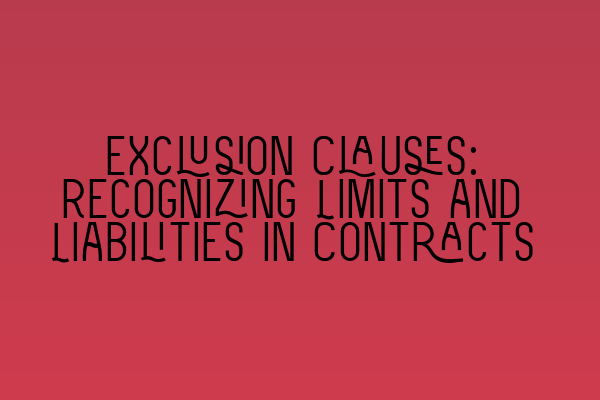Exclusion Clauses: Recognizing Limits and Liabilities in Contracts
Contracts play a crucial role in business transactions, ensuring that parties involved understand their rights and responsibilities. Within contracts, inclusion of exclusion clauses is a common practice to allocate risks and limit liabilities. However, it is essential to recognize the limits and liabilities associated with exclusion clauses to ensure fairness and protect the interests of all parties involved.
What are Exclusion Clauses?
Exclusion clauses are contractual provisions that aim to limit or exclude liability for certain types of loss or damage. These clauses typically allocate risk between the parties involved in a contract. They can be found in various types of contracts, such as sales contracts, service agreements, and lease agreements.
The Importance of Recognizing Limits
While exclusion clauses can be beneficial for businesses by reducing potential liabilities, they must be implemented within legal limits. The law imposes certain restrictions to prevent unfair contracts and protect the rights of individuals. Therefore, it is crucial to understand the limits to ensure the enforceability and validity of the exclusion clauses.
Unfair Contract Terms Act 1977
One of the key pieces of legislation governing exclusion clauses is the Unfair Contract Terms Act 1977 (UCTA). UCTA sets out guidelines for terms that exclude or limit liability in contracts. The act states that any exclusion clause must be reasonable, fair, and transparent to be enforceable.
Reasonableness Test
The reasonableness test is a significant aspect of UCTA. If a party seeks to rely on an exclusion clause in a contract, the court will assess whether it satisfies the reasonableness test. Factors such as the bargaining power of the parties, the availability of alternatives, and the nature of the contract will be considered.
To better understand the reasonableness test and its application in exclusion clauses, you can refer to our comprehensive article on SQE 1 Practice Exam Questions. This article delves into the subject matter and provides practice questions to help you solidify your understanding.
Transparency and Fairness
Exclusion clauses must also be transparent and fair. They should be clearly written, easily understandable, and brought to the attention of the other party before or at the time of entering the contract. Any ambiguity or hidden terms would likely be deemed unfair and unenforceable in court.
To gain further insights into contract transparency and fairness, our article on SQE 1 Practice Mocks FLK1 FLK2 is an excellent resource. It covers practice mocks and quizzes to test your knowledge on these essential concepts.
Exemption Clauses in Professional Negligence
In professional negligence cases, exclusion and limitation of liability clauses are often scrutinized closely by the courts. Professionals, such as doctors, lawyers, and accountants, owe a duty of care to their clients. Therefore, any attempts to exclude or limit liability in such cases are subject to even stricter scrutiny.
For a more in-depth understanding of professional negligence and the application of exclusion clauses, our SQE 2 Preparation Courses article offers comprehensive resources to guide you through the complexities of this area.
Seeking Legal Advice
Given the intricacies involved in drafting and enforcing exclusion clauses, seeking legal advice is always advisable. A qualified solicitor specializing in contract law can provide valuable insights and ensure compliance with legal requirements, avoiding potential pitfalls.
At SQE Contract Law, our team of experts possesses in-depth knowledge and experience in contract law matters. If you require professional assistance, please don’t hesitate to reach out to us.
Conclusion
Exclusion clauses offer a valuable tool for businesses to allocate risks and limit liabilities. However, it is crucial to understand the limits and liabilities associated with these clauses to ensure fairness and compliance with the law. By recognizing the legal requirements, seeking legal advice when necessary, and keeping yourself updated on the subject matter, you can effectively navigate the complexities of exclusion clauses in contracts.
Remember to stay informed about the latest SRA SQE Exam Dates and our SQE 1 Preparation Courses to stay ahead in your legal career.
